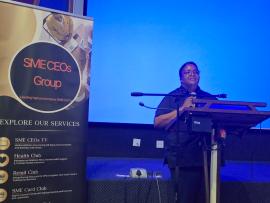
Women entrepreneurs urged to harness procurement opportunities
Women entrepreneurs urged to harness procurement opportunities Deputy Minister for Women, Youth and Persons with Disabilities, Mmapaseka Steve Letsike, has called on women entrepreneurs across sectors including ICT, agriculture, finance, education, hospitality, energy, and climate to take advantage of legal frameworks, government programmes, and the 40% public procurement target to strengthen their businesses. Speaking at the Women-Owned Business Empowerment series in Richards Bay, on Saturday, Letsike stressed that the commitments to women’s economic participation must be “tracked and enforced.” “Empowerment is not an act of goodwill; it is our collective responsibility,” she said. Letsike noted that access to finance remains one of the greatest obstacles for women entrepreneurs. “Women are less likely to have collateral, less likely to be considered “credit-worthy” by traditional banks, and more likely to face discrimination in the allocation of capital,” the Deputy Minister said. Government has introduced measures such as the R3.2 billion Women Empowerment Fund, managed by the Industrial Development Corporation (IDC), and procurement reforms that channel at least 40% of public sector procurement spend to women-owned businesses. However, Letsike acknowledged that the implementation gaps remain, and bureaucracy continue to frustrate the same entrepreneurs it seeks to support. “Our task is to ensure that policy commitments translate into real opportunities on the ground. Beyond finance, we must address access to markets. “Too often, women’s businesses are confined to the informal sector, unable to grow beyond micro-enterprise level because they cannot access supply chains,” the Deputy Minister said. The Deputy Minister highlighted the role of the Women’s Economic Assembly, which brings together government, business, and civil society to open value chains in sectors such as mining, agriculture, automotive, retail, and ICT sectors to women-owned enterprises. “These commitments must now be tracked and enforced,” Letsike said. Digital inclusion While acknowledging that the role of the Fourth Industrial Revolution (4IR) in reshaping how people live and work, Letsike said the digital divide threatens to leave women behind. “In South Africa, women are less likely to have access to smartphones, data, or digital literacy training. Yet, digital platforms are increasingly where businesses are born, where trade is conducted, and where opportunities are found, particularly with the rise of e-commerce as a disruptive force on how business is conducted. She added that programmes such as SA Connect, the Smart Africa Youth Chapter, and initiatives by the Department of Communications and Digital Technologies to expand broadband access must prioritise women, especially in rural and township areas. “When women are digitally connected, they are economically connected,” she said. Letsike also emphasised that empowerment strategies must account for the diverse realities faced by women. “Young women face higher unemployment rates than men. Women with disabilities encounter double discrimination in accessing opportunities. Rural women must contend with geographic isolation and poor infrastructure. Migrant women face legal and social barriers to inclusion. “An effective empowerment strategy cannot treat women as a monolith, it must be tailored, intersectional, and responsive to the lived realities of diverse women,” the Deputy Minister said. – SAnews.gov.za GabiK Mon, 09/01/2025 - 14:51 12 views